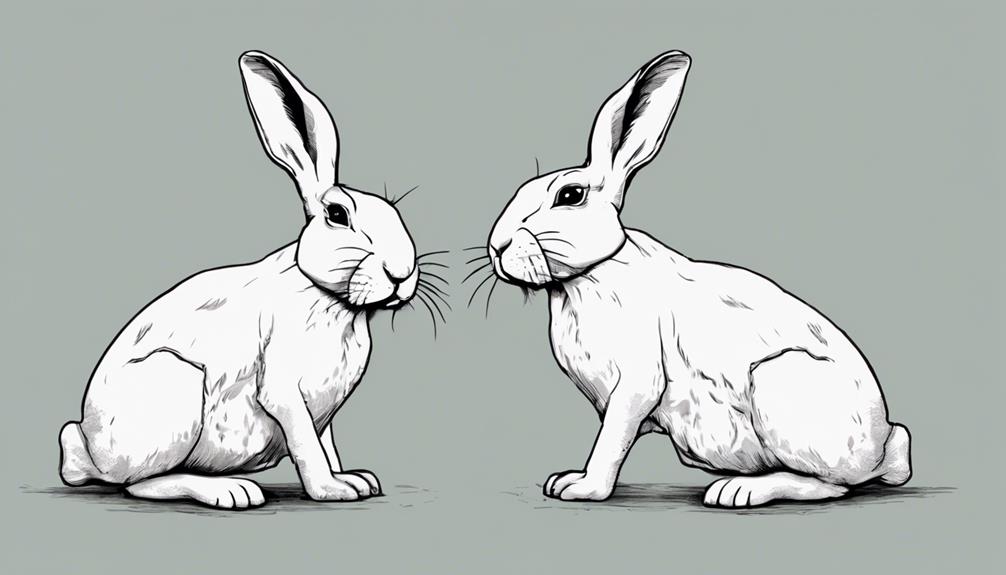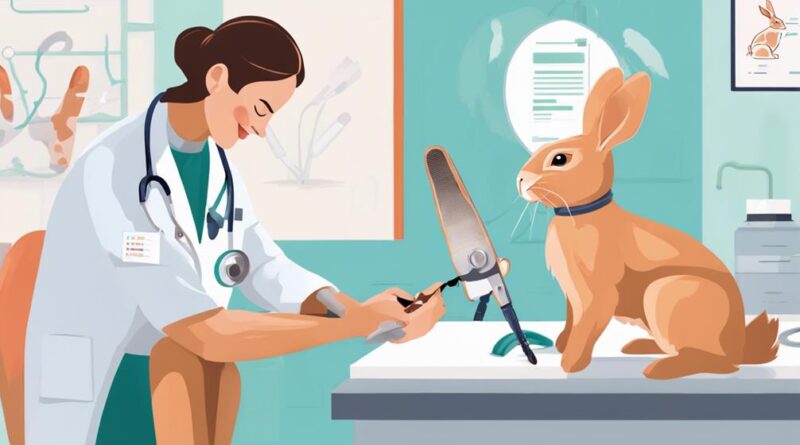Essential Tips for Preventive Rabbit Healthcare
Are you aware of the key practices to ensure your rabbit's health and well-being?
Proper preventive healthcare for rabbits goes beyond just regular feedings and cage cleanings. By incorporating a few essential tips into your rabbit care routine, you can significantly enhance your furry friend's quality of life and potentially extend their lifespan.
From nutrition and veterinary check-ups to dental care and parasite prevention, each aspect plays a crucial role in maintaining your rabbit's overall health.
Understanding Rabbit Nutrition
When caring for your rabbit, understanding their nutritional needs is crucial to their overall health and well-being. Providing a proper diet is essential for maintaining your rabbit's digestive health. Rabbits are herbivores, meaning their diet should consist mainly of hay. Hay provides the necessary fiber to keep their digestive system functioning properly. Make sure to offer unlimited amounts of fresh, high-quality hay such as timothy, orchard grass, or oat hay.
In addition to hay, rabbits also need a small amount of fresh vegetables daily. Leafy greens like kale, romaine lettuce, and cilantro are excellent choices. These vegetables not only provide essential nutrients but also help with hydration. Introduce new vegetables gradually to prevent digestive upsets. Avoid giving your rabbit fruits, as they're high in sugar and can lead to obesity and other health issues.
Pellets formulated specifically for rabbits can be given in limited quantities to ensure they receive all the necessary vitamins and minerals. However, pellets shouldn't be the main part of their diet. Always check the ingredients of the pellets and opt for high-fiber, low-calcium options.
Importance of Regular Vet Visits
Understanding Rabbit Nutrition is key to ensuring your pet's well-being, and part of maintaining their health includes recognizing the Importance of Regular Vet Visits. Just like humans, rabbits require routine check-ups to monitor their overall health and address any potential issues before they escalate. By scheduling regular vet visits, you can stay informed about your rabbit's well-being and ensure they receive the necessary care to live a long and healthy life.
Vet visits are crucial for following vaccination schedules tailored to your rabbit's specific needs. Vaccinations protect your pet from various diseases, some of which can be life-threatening. Your vet will advise you on the appropriate vaccines and their schedules to keep your rabbit safe and healthy.
During routine check-ups, your vet will conduct thorough examinations to assess your rabbit's physical condition and catch any health concerns early on. They can provide guidance on proper diet, exercise, and overall care to optimize your rabbit's well-being. If any issues are detected, prompt action can be taken to prevent them from worsening.
Maintaining Proper Hygiene Practices
Proper hygiene practices are essential for ensuring your rabbit's health and well-being. When it comes to proper grooming, you should brush your rabbit regularly to prevent matting and remove loose fur. Long-haired rabbits may require more frequent grooming to avoid tangled fur and potential skin issues. Additionally, trimming your rabbit's nails every 4-6 weeks is crucial to prevent overgrowth, which can lead to discomfort and difficulty moving around.
In terms of habitat cleanliness, it's important to clean your rabbit's living space frequently. Remove any uneaten food, soiled bedding, and droppings daily to maintain a hygienic environment. Deep clean the entire habitat at least once a week, using pet-safe cleaning products to disinfect surfaces effectively. This practice helps prevent the buildup of bacteria and parasites that could harm your rabbit's health.
Furthermore, ensure that your rabbit has access to fresh water at all times, and clean and refill their water bottle or bowl daily. Proper hydration is key to your rabbit's overall well-being and can prevent urinary tract issues.
Monitoring Rabbit's Weight and Behavior
Regularly monitoring your rabbit's weight and behavior is crucial for assessing their overall health and well-being. Weight management plays a significant role in your rabbit's health. Sudden weight loss or gain could indicate underlying issues that need attention. Use a kitchen scale to weigh your rabbit regularly, and consult your veterinarian if you notice any concerning changes.
Behavioral changes can also signal health problems. Pay attention to your rabbit's usual habits and behaviors. Any noticeable deviations like lethargy, aggression, excessive hiding, or changes in eating and drinking patterns should prompt a closer look. These changes might indicate pain, stress, illness, or discomfort.
Diet adjustments may be necessary based on your rabbit's weight and overall health. Consult with a vet to ensure your rabbit's diet is appropriate for their age, size, and activity levels. Proper nutrition is essential for maintaining a healthy weight and preventing various health issues.
Monitoring your rabbit's activity levels is crucial. Rabbits are naturally active animals, so a sudden decrease in activity could be a sign of an underlying problem. Encourage exercise through appropriate toys and safe play areas. Regularly interacting with your rabbit can also help you notice any changes in behavior or activity levels promptly.
Providing Enrichment and Exercise
To enhance your rabbit's well-being, engage in providing engaging activities and opportunities for movement. Playtime opportunities are essential for your rabbit's mental stimulation and overall happiness. Consider setting up a designated play area where your rabbit can explore, hop around, and interact with toys. Simple items like cardboard boxes, tunnels, or even untreated wicker baskets can provide hours of entertainment.
Safe exercise options are crucial for your rabbit's physical health. Encourage daily exercise by allowing your rabbit time to roam in a bunny-proofed space. Ensure that all electrical cords, toxic plants, and small objects are out of reach. You can also create an outdoor enclosure or use a harness for supervised outdoor play. Social interaction is beneficial for rabbits, so consider getting your rabbit a compatible bunny companion for companionship and play.
Incorporating variety into your rabbit's environment is key to preventing boredom. Rotate toys regularly to keep things interesting and provide different textures and challenges for your rabbit to explore. Additionally, hiding treats or fresh herbs around their play area can encourage natural foraging behaviors and mental engagement. Remember, a happy and active rabbit is likely to be a healthy rabbit.
Preventing Dental Issues in Rabbits
Keep your rabbit's teeth healthy by ensuring they've access to a variety of chew toys and fibrous foods. Proper tooth care is essential for preventing dental issues in rabbits. Rabbits' teeth continuously grow, so providing them with suitable items to chew on helps wear down their teeth naturally and prevents overgrowth or malocclusion.
Incorporating chew toys made of safe materials like untreated wood or cardboard can encourage your rabbit to gnaw and grind their teeth, maintaining proper dental alignment. Additionally, offering fibrous foods such as hay, fresh vegetables, and leafy greens supports dental health by promoting chewing and aiding in natural tooth wear.
Dietary considerations play a crucial role in preventing dental problems in rabbits. A high-fiber diet is key to maintaining good oral health, as it requires extensive chewing, which helps prevent sharp points or spurs from forming on the teeth. Avoid excessive sugary treats or foods high in carbohydrates, as they can lead to dental issues such as overgrowth or abscesses.
Recognizing Signs of Illness Early

Maintaining your rabbit's overall health involves being vigilant in recognizing early signs of illness. One crucial aspect to monitor is temperature regulation. Rabbits are sensitive to extreme temperatures; signs of overheating include lethargy, rapid breathing, and drooling, while shivering, hunching, or seeking warmth may indicate they're too cold. Ensure their living environment is adequately insulated and provide cooling pads or warm blankets as needed to help them regulate their body temperature effectively.
Stress management is another key factor in preventing illnesses in rabbits. Stress can weaken their immune system, making them more susceptible to diseases. Signs of stress in rabbits include decreased appetite, excessive grooming, aggression, or hiding away. To mitigate stress, provide a quiet and secure living space, enrich their environment with toys and tunnels, and handle them gently to build trust.
Early detection of illness is vital for prompt treatment and better outcomes. Keep a close eye on your rabbit's behavior, eating habits, and physical appearance. Any deviations from their usual routine should prompt a visit to the veterinarian. By staying observant and proactive in monitoring your rabbit's health, you can catch potential issues early and ensure they receive the care they need to stay happy and healthy.
Parasite Prevention and Control
Monitoring your rabbit's health regularly can help prevent parasitic infestations and ensure their well-being. Flea prevention is essential to keep these pesky parasites at bay. Consult your veterinarian for safe and effective flea prevention products suitable for rabbits. Additionally, intestinal worms can pose a threat to your rabbit's health. Implement a regular deworming schedule as recommended by your vet to protect your furry friend from these internal parasites.
Tick control is crucial in preventing tick-borne diseases in rabbits. Ensure your rabbit's living environment is tick-free by keeping grass trimmed short and checking for ticks regularly, especially after outdoor playtime. Consult your veterinarian for safe tick prevention methods suitable for rabbits.
Ear mites are another common issue that can affect rabbits. Keep an eye out for signs such as excessive scratching of the ears or head shaking. If you suspect ear mites, seek veterinary care promptly for proper diagnosis and treatment.
Frequently Asked Questions
How Can I Train My Rabbit to Use a Litter Box?
To litter train your rabbit, start by placing the litter box in a spot where your rabbit tends to go. Use positive reinforcement like treats when they use the box.
If they've accidents, clean up with an enzyme cleaner to remove the scent. Consider behavior modification techniques and be patient.
With consistent training and the right placement of the litter box, your rabbit can learn to use it effectively.
What Are Some Common Household Items That Are Toxic to Rabbits?
To keep your bunny safe, rabbit-proof your home by keeping toxic items like chocolate, onions, and certain houseplants out of reach.
Opt for safe rabbit treats like hay, leafy greens, and small pieces of fruit.
Remember to always supervise your rabbit when they're out of their enclosure to prevent accidents.
Can Rabbits Be Spayed or Neutered?
Yes, rabbits can be spayed or neutered.
These surgical options are common for managing their health and behavior. Spaying involves removing the uterus and ovaries in females, while neutering involves removing the testes in males.
These procedures can prevent certain health issues and help control breeding behaviors. Consider consulting a veterinarian for more information on the benefits of spaying or neutering your rabbit.
What Should I Do if My Rabbit Stops Eating or Drinking?
If your rabbit stops eating or drinking, it's crucial to address this promptly.
Focus on hydration management by offering fresh water and wetting their food.
Monitor for signs of digestive issues like bloating or diarrhea. Seek medical intervention if the problem persists.
Your vet may recommend diet adjustments or provide medications to help your rabbit recover.
How Do I Introduce a New Rabbit to My Existing Rabbit?
When introducing a new rabbit to your existing one, start by keeping them in separate spaces to adjust. Slowly swap their living areas to get them used to each other's scents.
Use bonding techniques like supervised playtime to help them socialize. Watch for behavior problems and be patient with the process.
Gradually introduce them in neutral territory and monitor their interactions closely. With the right introducing strategies, your rabbits can become great companions.
Conclusion
In conclusion, by following these essential tips for preventive rabbit healthcare, you can ensure your furry friend stays happy and healthy.
Remember to provide a balanced diet, schedule regular vet check-ups, keep their living space clean, monitor their weight and behavior, engage them with enrichment activities, watch out for dental issues, recognize signs of illness early, and prevent parasites.
Taking proactive steps now will lead to a long and fulfilling life for your beloved rabbit.
